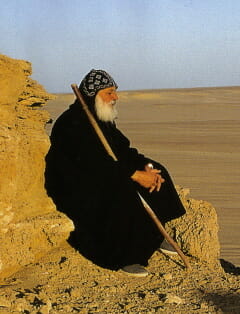
Apr 15, 2015 | Focolare Worldwide
 «Many have tried to explain the roots and reasons behind the start of monastic life, but the sayings and experiences of the Fathers show that the monks are “living martyrs,” and that they “abandoned the world to embrace the sole reality worth living for – God.” It is as if they wanted to respond to God’s love, which is fully described in a verse of the Coptic Mass we call the Divine Liturgy, which addresses God saying: “Of all the words said, there is nothing that can describe Your love for mankind.” St. Jerome says that their asceticism and life as hermits proclaim, “we have been struck by the darts of Divine love,” and each one repeats: “I have found what my soul longs for; I will hold on to it tightly and never leave it.” These monks, therefore, only wishing to give themselves completely to this love and to consecrate themselves to Him, had no choice but to leave the cities.
«Many have tried to explain the roots and reasons behind the start of monastic life, but the sayings and experiences of the Fathers show that the monks are “living martyrs,” and that they “abandoned the world to embrace the sole reality worth living for – God.” It is as if they wanted to respond to God’s love, which is fully described in a verse of the Coptic Mass we call the Divine Liturgy, which addresses God saying: “Of all the words said, there is nothing that can describe Your love for mankind.” St. Jerome says that their asceticism and life as hermits proclaim, “we have been struck by the darts of Divine love,” and each one repeats: “I have found what my soul longs for; I will hold on to it tightly and never leave it.” These monks, therefore, only wishing to give themselves completely to this love and to consecrate themselves to Him, had no choice but to leave the cities.
St. Basil clearly announced: “Whoever loves God leaves all and goes towards Him.” And it is said that St. Tawadros, disciple of St. Pachomius, “had only one interest in the world – to love God with all his heart by following the command of Jesus Christ.” We can sense that the root of ascetic life is to resemble Christ: completely stripping oneself of all things, and following the Father’s will which is virginity, in continual contact with God the Father through prayer. Fr. Matta El Meskin explained it thoroughly: “The warranty of our consecration (as monks) lies in our holding on to Christ personally, and following the Bible’s teachings. In this way, with Christ and the Bible, we will be able to pursue our path in continuous growth, to the very end.”
The choice of the consecrated person is to follow Jesus, the “Way, the Truth and the Life.” This means living for Christ and for him alone and following him in his lifestyle. He chose poverty, virginity and obedience. The monk, therefore, does not choose poverty, but Christ the poor one. The choice is the person of Jesus himself, and so, of what Christ lived, and the how and why he lived in this way. As for the communitarian aspect in the ascetic life of the desert monks, let us recall how – for example in the monasteries that followed after St. Pachomius – the life of communion became the extension of the primitive Church during the time of the apostles. Looking at the life of the Fathers, we can trace some communitarian characteristics: mutual love (St. Pachomius always exhorted his disciples to love one another, and that it was due to the charity among the monks that this life spread and continued up to today), and life together (the dominant feature of these first Christian communities was the “sharing of all they had” in all the aspects of the monks community life).
The teachings of the Desert Fathers remind me about the meditation of Chiara Lubich, “The great attraction of modern times,” which fully expresses what I feel: “To penetrate to the highest contemplation, while mingling with everyone.” It is a contemplation that actualises the life of the Fathers in this century, but in the midst of the world.
T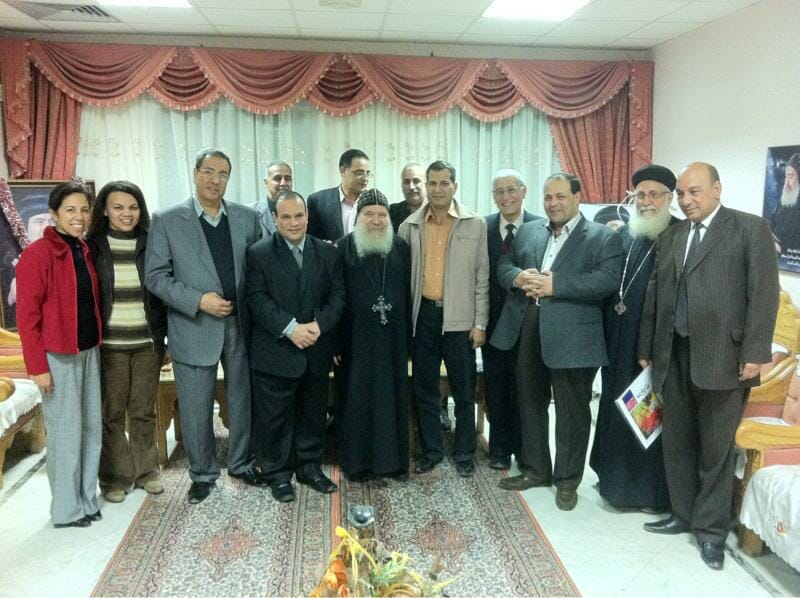 he spiritual presence of Jesus in our midst with the Catholic focolarine with whom I live in the Focolare Centre in Sohag, and the commitment to love each other, have made us like real sisters and caused us to experiment the joy of the Risen Lord, beyond all our differences. In our daily life we share everything we have: we pray, work, rejoice and share the moments of suffering of the people around us. We try to bear witness through our lives, that God is love.
he spiritual presence of Jesus in our midst with the Catholic focolarine with whom I live in the Focolare Centre in Sohag, and the commitment to love each other, have made us like real sisters and caused us to experiment the joy of the Risen Lord, beyond all our differences. In our daily life we share everything we have: we pray, work, rejoice and share the moments of suffering of the people around us. We try to bear witness through our lives, that God is love.
Living for the fullness of unity in Christ’s Church “that all may be one,” fascinates me more and more. I rejoice about the beauty and variety of the gifts of God I find in the various Churches, and the aspiration and emotion of seeing that we are united in Christ in our midst and in the future of the Church in God’s design.
My country also testifies to this with the big and small steps taken along the ecumenical journey. For example, there is now an ecumenical commission which was formed some years ago, with people of every Christian confession existing in Sohag. We meet in a different Church every time: this year it will be in the Coptic Orthodox Church. On 5 March almost all the local heads of the churches were present. The main theme was “the victory over evil,” starting from the persecution of Christians in Libya, which traces the steps of the people of Israel on their departure from Egypt. «The flag that flies above us is that of God’s love,» affirmed the Coptic Orthodox Bishop Bakhoum, who wished that all those present «will always meet in Love.»
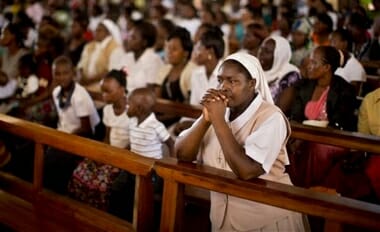
Apr 15, 2015 | Focolare Worldwide, Senza categoria
”The slaughter in Garissa took place on Good Friday. 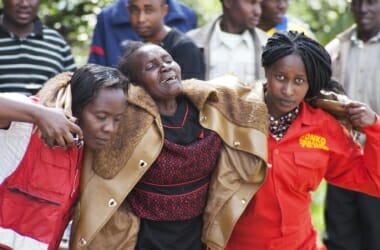 I went to the morgue where they were taking the bodies of the students for identification, not far from my home in Nairobi. I took my camera along. It was impossible not to hear the sirens. I found the parents of the murdered students fainting on one side. . . and on ther other my colleagues with news cameras. I could certainly have shot a few interviews, but I just couldn’t do it; I found myself weeping with the families. There was strong pressure from all sides, opinions from the public who were anxious for news. But I needed time to digest the painful situation in order to be able to say something that would be constructive. I felt my task was to remain quiet with this pain and resist the pressure.”
I went to the morgue where they were taking the bodies of the students for identification, not far from my home in Nairobi. I took my camera along. It was impossible not to hear the sirens. I found the parents of the murdered students fainting on one side. . . and on ther other my colleagues with news cameras. I could certainly have shot a few interviews, but I just couldn’t do it; I found myself weeping with the families. There was strong pressure from all sides, opinions from the public who were anxious for news. But I needed time to digest the painful situation in order to be able to say something that would be constructive. I felt my task was to remain quiet with this pain and resist the pressure.” 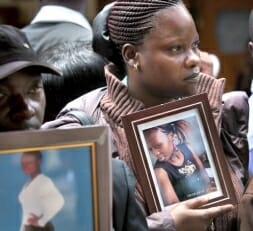 There were over 150 victims of the attack by Somali extremists at the Garissa University College in North East Kenya. The terrorists began their attack on April 3rd, targeting the Christian students. It was only a day-long front attack by government forces that prevented an even worse slaughter. But the general fear of new attacks remains so high that any incident is enough to unleash panic with very serious consequences as happened on April 12th in another university college at Uthiru, near Nairobi. An electrical transfomer caught fire on the fourth and fifth floor, causing an explosion that was similar to that of the bomb. The number of the dead reached 150 with several others seriously wounded. “From the first days of the attack, many of us from our community were in the morgue where 148 bodies of murdered students were taken, in order to console the people who had lost children,” Charles Besigye from the local Focolare community recounts. “Today, on April 11th, we and some of our young people spent the afternoon at the morgue. It was so heartbreaking! People in total suspense who, a week later have not yet found their children. Some bodies have already been identified and they are carrying them back to their villages for burial. The suffering is huge. . . the relatives a desperate sight.We stayed with them to share their suffering, and to help them carry this heavy cross. To weep with those who are still able to, because there are some who have no more tears to shed. One of us offered to help prepare the bodies of the deceased students before their relatives saw them. It was a powerful experience! There’s much solidarity on the part of several associations and the Kenyan people. They bring bread, milk, beverages, and so on. . . The sacred atmosphere that we breathe is overwhelming. There are people who offer comfort, others who pray to God.”
There were over 150 victims of the attack by Somali extremists at the Garissa University College in North East Kenya. The terrorists began their attack on April 3rd, targeting the Christian students. It was only a day-long front attack by government forces that prevented an even worse slaughter. But the general fear of new attacks remains so high that any incident is enough to unleash panic with very serious consequences as happened on April 12th in another university college at Uthiru, near Nairobi. An electrical transfomer caught fire on the fourth and fifth floor, causing an explosion that was similar to that of the bomb. The number of the dead reached 150 with several others seriously wounded. “From the first days of the attack, many of us from our community were in the morgue where 148 bodies of murdered students were taken, in order to console the people who had lost children,” Charles Besigye from the local Focolare community recounts. “Today, on April 11th, we and some of our young people spent the afternoon at the morgue. It was so heartbreaking! People in total suspense who, a week later have not yet found their children. Some bodies have already been identified and they are carrying them back to their villages for burial. The suffering is huge. . . the relatives a desperate sight.We stayed with them to share their suffering, and to help them carry this heavy cross. To weep with those who are still able to, because there are some who have no more tears to shed. One of us offered to help prepare the bodies of the deceased students before their relatives saw them. It was a powerful experience! There’s much solidarity on the part of several associations and the Kenyan people. They bring bread, milk, beverages, and so on. . . The sacred atmosphere that we breathe is overwhelming. There are people who offer comfort, others who pray to God.” During the Way of the Cross at the Roman Colosseum on the evening of Good Friday, the Pope used harsh words: “The thirst of Your Merciful Father,” said Pope Francis, “which in You wished to embrace, forgive and save humanity, makes us think of the thirst of our persecuted brothers and sisters, beheaded and crucified for their faith in You, right beneath our eyes, or often with our complicit silence.” It is a strong warning that urges us not to remain silent.
During the Way of the Cross at the Roman Colosseum on the evening of Good Friday, the Pope used harsh words: “The thirst of Your Merciful Father,” said Pope Francis, “which in You wished to embrace, forgive and save humanity, makes us think of the thirst of our persecuted brothers and sisters, beheaded and crucified for their faith in You, right beneath our eyes, or often with our complicit silence.” It is a strong warning that urges us not to remain silent.
Apr 14, 2015 | Focolare Worldwide
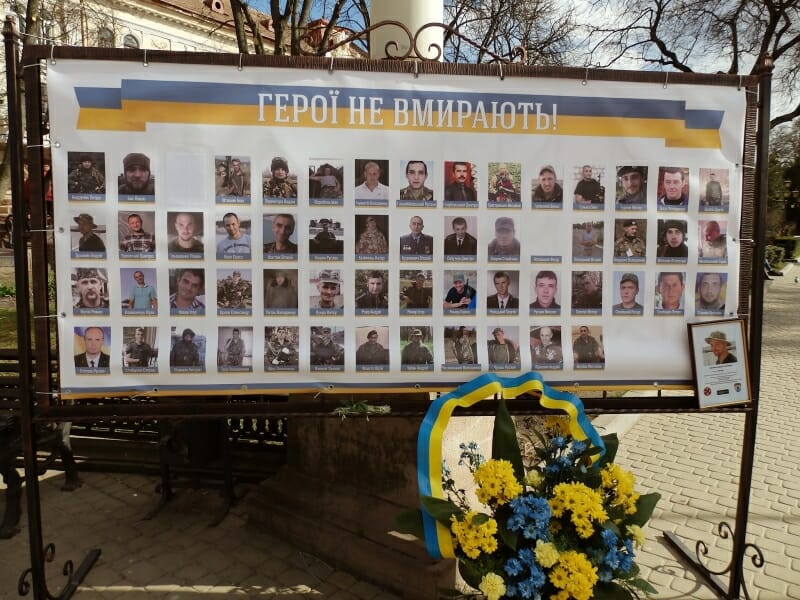
Apr 13, 2015 | Focolare Worldwide
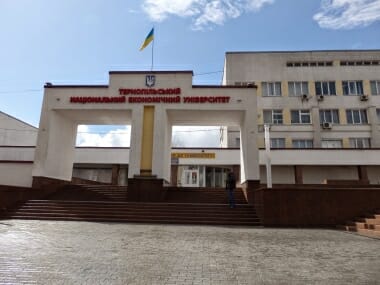 In his heartfelt plea for our many brothers and sisters in the world who “unjustly suffer the consequences of present violence and war,” the Pope also prayed for “the beloved Ukraine” that “it might find peace and hope thanks to the commitment of all interested parties.” Yes, because the war in Ukraine even now continues in its absurdity and violence. We are talking with Roberto Catalano who has been invited to hold conferences on the topic of dialogue, at the Universties of Leopoli, Ivanova Franziksva and Ternopil. It is significant that in the midst of the ‘crisis,’ the young people (and their tutor), rather than becoming entrenched in their private worlds, are out working for deeper dialogue as the only resource that directs their every effort. Roberto, what was the general feeling among the people you met?
In his heartfelt plea for our many brothers and sisters in the world who “unjustly suffer the consequences of present violence and war,” the Pope also prayed for “the beloved Ukraine” that “it might find peace and hope thanks to the commitment of all interested parties.” Yes, because the war in Ukraine even now continues in its absurdity and violence. We are talking with Roberto Catalano who has been invited to hold conferences on the topic of dialogue, at the Universties of Leopoli, Ivanova Franziksva and Ternopil. It is significant that in the midst of the ‘crisis,’ the young people (and their tutor), rather than becoming entrenched in their private worlds, are out working for deeper dialogue as the only resource that directs their every effort. Roberto, what was the general feeling among the people you met? 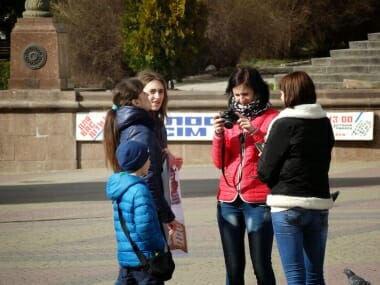 “At the end of one conference, one of my scholastic colleagues showed me three photos of some ex-students of the University who had been killed in the conflict in the south of the country. With eyes filled with tears, he told me that every evening after lessons, a group of students gathers in the cafeteria of the university to cook Ukrainian dishes, which are then frozen and delivered to soldiers. Annother woman told me about her six year-old son who draws cartoons and sends them to soldiers, as a sign of thanks for defending his country. Unfortunately, unlike last year, the news is no longer reporting on what is taking place in Ukraine. Yet, there is actually a war underway in East Ukraine.” There seems to be no way out of the situation that is generating suffering and suspense in the hearts of the people. . . “I had living proof of this deep suffering during every moment of my stay in Ukraine. Students and professors asked me what I thought about the situation in the country and, above all, what the rest of Europe was saying. I didn’t have the nerve to express judgements. Faced with their fear and suffering I preferred to listen and stay silent. I was impressed by the strength and dignity of that people, but it also frightened me that the rest of Europe and of the world have abandoned them to their fate, aggravated also by the growing nationalism, another phenomenon that could be hiding large dangers for the future.”
“At the end of one conference, one of my scholastic colleagues showed me three photos of some ex-students of the University who had been killed in the conflict in the south of the country. With eyes filled with tears, he told me that every evening after lessons, a group of students gathers in the cafeteria of the university to cook Ukrainian dishes, which are then frozen and delivered to soldiers. Annother woman told me about her six year-old son who draws cartoons and sends them to soldiers, as a sign of thanks for defending his country. Unfortunately, unlike last year, the news is no longer reporting on what is taking place in Ukraine. Yet, there is actually a war underway in East Ukraine.” There seems to be no way out of the situation that is generating suffering and suspense in the hearts of the people. . . “I had living proof of this deep suffering during every moment of my stay in Ukraine. Students and professors asked me what I thought about the situation in the country and, above all, what the rest of Europe was saying. I didn’t have the nerve to express judgements. Faced with their fear and suffering I preferred to listen and stay silent. I was impressed by the strength and dignity of that people, but it also frightened me that the rest of Europe and of the world have abandoned them to their fate, aggravated also by the growing nationalism, another phenomenon that could be hiding large dangers for the future.”  Exactly as the Pope said when he talked about the slaughter of the students in Kenya. In the face of these atrocities, it seems like the international community turns its eyes the other way. And yet, the Ukrainian people are also our brothers and sisters, because of our common humanity and our common Christian faith that inspires them. “I visited a large church where the liturgy was being celebrated according to the Eastern Rite. The beautiful and very modern iconostasis was quite striking, but more surprising was the religiosity of the people who were so attentive and wrapt in prayer. I was struck by the long queue of people waiting for Confession. Seventy years of Marxism didn’t wipe out the faith of the people.” In your opinion, is there any hope there will be peace? “I only visited one half of Ukraine and wasn’t able to hear the other side, but they also have their suffering that is perhaps more difficult to understand. And it’s another story over here with its own twists and turns, but also with its present problems that are dictated by international interests in gas and oil. There is the risk of silence that covers up the suffering of millions of people. As the Pope suggested, there is a need for commitment from all the interersted parties. This is the only way an enduring peace will be able to be reached.
Exactly as the Pope said when he talked about the slaughter of the students in Kenya. In the face of these atrocities, it seems like the international community turns its eyes the other way. And yet, the Ukrainian people are also our brothers and sisters, because of our common humanity and our common Christian faith that inspires them. “I visited a large church where the liturgy was being celebrated according to the Eastern Rite. The beautiful and very modern iconostasis was quite striking, but more surprising was the religiosity of the people who were so attentive and wrapt in prayer. I was struck by the long queue of people waiting for Confession. Seventy years of Marxism didn’t wipe out the faith of the people.” In your opinion, is there any hope there will be peace? “I only visited one half of Ukraine and wasn’t able to hear the other side, but they also have their suffering that is perhaps more difficult to understand. And it’s another story over here with its own twists and turns, but also with its present problems that are dictated by international interests in gas and oil. There is the risk of silence that covers up the suffering of millions of people. As the Pope suggested, there is a need for commitment from all the interersted parties. This is the only way an enduring peace will be able to be reached.
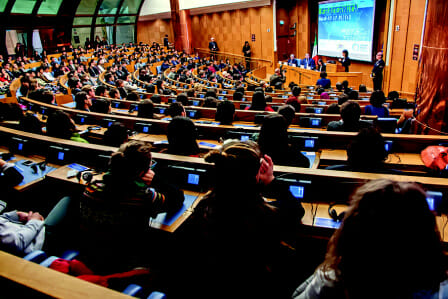
Apr 12, 2015 | Non categorizzato
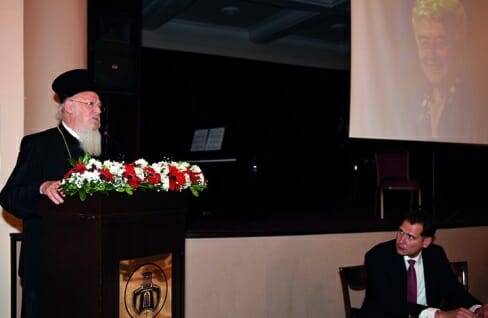
Patriarch Bartholomew
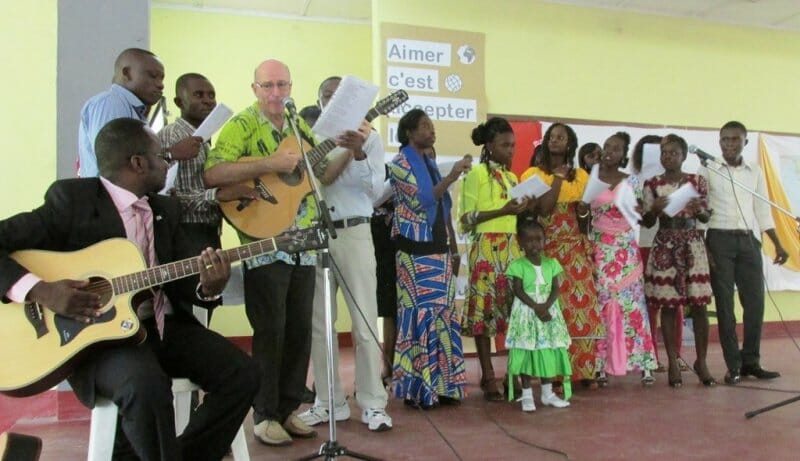 Within crisis situations – An answer to the political crisis going on in Congo appeared as the theme of two meetings held in that land. In Lubumbashi 370 people came forward, both Christian and Muslim. Young people from the Focolare presented an artistic rendition of Chiara’s love for the poor; her encounter with Igino Giordani; and her ‘dream’ for the unity of the human family. The Mass was animated by over fifty seminarians. Four hundred people attended the event in Goma, including a large group of politicians from the province of North-Kivu and representatives from civil society. Following the event, RTNC broadcasted the event in four local languages. Some events were held in a few of the world’s hotspots. In Nigeria, for example, there were several events: in Yola to where many refugees have fled. The bishop celebrated Mass for Chiara, praying for peace. In Abuja and Lagos young people held a two-day preperation event for other young people. In Onitsha there was a meeting with more than 300 adults, young people and children. In Jos, where it was not possible to hold a large gathering because of an explosion a few days earlier, the Focolare groups paid a visit to a Penal Institute for Minors. Peace was also the main topic at a day-long event organised in Bujumbura, Burundi, with over a thousand people. The programme included many testimonies that highlighted the possibility of living in harmony with others and building peace in places where that is not easily done. The Archbishop Evariste Ngoyagoye attended the morning portion of the programme. In Central America, politics is a hot topic. From Honduras they write: “tired of corrupt politics and bombarded by violent news that generates discouragement in the popultiaon, we organised this event in order to share what the charism of unity has to offer both in testimony and in thought.” In Salvador that awaits the Beatification of Oscar Romero, we asked how unity could be lived in the midst of violence. Amongst the testimonies was that of Francesco, who was assaulted by a pair of armed youngsters. He was able to dialogue with them and speak to them about God. The boys were completely blown away; putting down their weapons they walked away. In Pakistan, in Karachi, Lahore, Rawalpindi, Dalwal, over a thousand people held four celebrations, with hopeful expectancy following the tragic events of March 15 in Yohannabad.
Within crisis situations – An answer to the political crisis going on in Congo appeared as the theme of two meetings held in that land. In Lubumbashi 370 people came forward, both Christian and Muslim. Young people from the Focolare presented an artistic rendition of Chiara’s love for the poor; her encounter with Igino Giordani; and her ‘dream’ for the unity of the human family. The Mass was animated by over fifty seminarians. Four hundred people attended the event in Goma, including a large group of politicians from the province of North-Kivu and representatives from civil society. Following the event, RTNC broadcasted the event in four local languages. Some events were held in a few of the world’s hotspots. In Nigeria, for example, there were several events: in Yola to where many refugees have fled. The bishop celebrated Mass for Chiara, praying for peace. In Abuja and Lagos young people held a two-day preperation event for other young people. In Onitsha there was a meeting with more than 300 adults, young people and children. In Jos, where it was not possible to hold a large gathering because of an explosion a few days earlier, the Focolare groups paid a visit to a Penal Institute for Minors. Peace was also the main topic at a day-long event organised in Bujumbura, Burundi, with over a thousand people. The programme included many testimonies that highlighted the possibility of living in harmony with others and building peace in places where that is not easily done. The Archbishop Evariste Ngoyagoye attended the morning portion of the programme. In Central America, politics is a hot topic. From Honduras they write: “tired of corrupt politics and bombarded by violent news that generates discouragement in the popultiaon, we organised this event in order to share what the charism of unity has to offer both in testimony and in thought.” In Salvador that awaits the Beatification of Oscar Romero, we asked how unity could be lived in the midst of violence. Amongst the testimonies was that of Francesco, who was assaulted by a pair of armed youngsters. He was able to dialogue with them and speak to them about God. The boys were completely blown away; putting down their weapons they walked away. In Pakistan, in Karachi, Lahore, Rawalpindi, Dalwal, over a thousand people held four celebrations, with hopeful expectancy following the tragic events of March 15 in Yohannabad.  In institutional fora – In Seoul numerous deputies and people working in public adminstration met at the Parliament to take stock of the journey begun ten years ago towards a politics of brotherhood. In Madrid it was the Seat of the European Parliament to host a seminar on “One world, many peoples embracing diversity;” whereas, in Strasbourg, France, Seats of European Institutes hosted three-day events on the theme of fraternity as a political category. In Rome, a meeting titled “Chiara Lubich: Unity and Politics” was held at the Hall of the Palace of Parliamentary Groups of the Chamber of Deputies. Several politicians gave presentations at the roundtable organised in Toronto, Canada, which focused on Chiara’s vision of politics. In Solingen, Germany, the central theme of the event was the culture of fraternity in three specific areas: refugees, peace, and dialogue with other cultures. Over a hudred people attended from various confessions, religions and nationalities. “The political thought and action of Chiara Lubich” was the main theme of another project that was dedicated to Chiara at an event dedicated to her: the conference of Curitiba, Brazil, where commemorative postal stamps was also printed in her honour. The Parliament of the Province of Córdoba, Argentina, remembered Chiara by approving the decree of posthumous recognition of her work. Other political events were held in Italy, Hungary, Czech Republic, Portugal, Sweden, USA, Honduras, Mexico, Colombia, Tanzania, and Kenya. In other environments – Politics is not the only thing that was discussed on Chiara’s anniversary. Culture and the arts were at the centre of many quite original events. In Durban, South African Republic, the third edition of the “Chiara Lubich Memorial Lecture” was held with the participation of the niece of Mahatma Gandhi, Ela Gandhi. In Maracaibo, Venezuela, the Catholic University Cecilio Acosta (UNICA) held the Fourth Biannual Chiara Lubich Art Contest. It provided professional artists, art students and art lovers with the opportunity of displaying their work at the nations Republicj Square. In other countries March 14th events were opportunities to come together. One such event took place in Cuba at L’Avana with more than 200 people, and in Santiago de Cuba with 150 people. The local Focolare communities prepared the events and presented the Focolare Movement with their own testimonies and the impact of the spirituality of unity in many areas of their personal life and in society.In Cochabamba, Bolivia, there were 120 people. In Mexico City and in the territoryof Nezahualcoyotl Chiara was remembered during the Mariapolis. In Vietnam, both in Ho Chi Minh City to the south, and in the tiny village of Ngo Khe, Ha Noi in the north, people gathered around the altar to renew “before God and before Chiara, our commitment to be forever faithful to her legacy.” In Myanmar, at Yangon, where the majority of Focolare members never knew Chiara personally, they feel very drawn by her charism. Also in Thailand, both in Bangkok and in Chiang Mai, the Focolare Family gathered to celebrate. Six hundred people in the Slovack Republic, from Kosice and Bratislava. They write: “The testimonies from people of other Churches and from people with no religous reference, made us see how Chiara belongs to everyone. The Rector of the University of Trnava, Dr Peter Blaho, who in 2003 had conferred upon Chiara the honorary doctorate in Theology, shared his memory of meeting her. In Fontem, Cameroon, 500 people from all the surrounding villages joined with Fontem to remember “Mafua Ndem,” Chiara Lubich. The theme was “The impact of the ideal of Unity in areas of social life.” The young people from the college presented their experiences with the “cube of peace:” “From when we introduced the cube in our classes, theft and truancy have decreased; academic performance has improved, each student cares for the other student’s property; there’s more tolerance and we forgive one another more easily; and the sharing has grown amongst students. . .” Moments of prayer – Many civil and religious leaders attended Euchariastic celebrations that were held around the world. From the many interventions of Bishops and Cardinals at these celebrations, we present that of Cardinal Angelo Scola from Milan, Italy, who said among other things: “Our task today is to grasp with renewed awareness the dream that had animated the life and thought of Chiara, creating environments of brotherhood everywhere, wherever we find ourselves, and giving priority to the needs of the neighbour that is beside us, as well as the one that is far and living in lands where there is violence and war. This is how we want to become authentic witnesses of the charism that God gave to Chiara, being at the service of the Church and of humanity.”
In institutional fora – In Seoul numerous deputies and people working in public adminstration met at the Parliament to take stock of the journey begun ten years ago towards a politics of brotherhood. In Madrid it was the Seat of the European Parliament to host a seminar on “One world, many peoples embracing diversity;” whereas, in Strasbourg, France, Seats of European Institutes hosted three-day events on the theme of fraternity as a political category. In Rome, a meeting titled “Chiara Lubich: Unity and Politics” was held at the Hall of the Palace of Parliamentary Groups of the Chamber of Deputies. Several politicians gave presentations at the roundtable organised in Toronto, Canada, which focused on Chiara’s vision of politics. In Solingen, Germany, the central theme of the event was the culture of fraternity in three specific areas: refugees, peace, and dialogue with other cultures. Over a hudred people attended from various confessions, religions and nationalities. “The political thought and action of Chiara Lubich” was the main theme of another project that was dedicated to Chiara at an event dedicated to her: the conference of Curitiba, Brazil, where commemorative postal stamps was also printed in her honour. The Parliament of the Province of Córdoba, Argentina, remembered Chiara by approving the decree of posthumous recognition of her work. Other political events were held in Italy, Hungary, Czech Republic, Portugal, Sweden, USA, Honduras, Mexico, Colombia, Tanzania, and Kenya. In other environments – Politics is not the only thing that was discussed on Chiara’s anniversary. Culture and the arts were at the centre of many quite original events. In Durban, South African Republic, the third edition of the “Chiara Lubich Memorial Lecture” was held with the participation of the niece of Mahatma Gandhi, Ela Gandhi. In Maracaibo, Venezuela, the Catholic University Cecilio Acosta (UNICA) held the Fourth Biannual Chiara Lubich Art Contest. It provided professional artists, art students and art lovers with the opportunity of displaying their work at the nations Republicj Square. In other countries March 14th events were opportunities to come together. One such event took place in Cuba at L’Avana with more than 200 people, and in Santiago de Cuba with 150 people. The local Focolare communities prepared the events and presented the Focolare Movement with their own testimonies and the impact of the spirituality of unity in many areas of their personal life and in society.In Cochabamba, Bolivia, there were 120 people. In Mexico City and in the territoryof Nezahualcoyotl Chiara was remembered during the Mariapolis. In Vietnam, both in Ho Chi Minh City to the south, and in the tiny village of Ngo Khe, Ha Noi in the north, people gathered around the altar to renew “before God and before Chiara, our commitment to be forever faithful to her legacy.” In Myanmar, at Yangon, where the majority of Focolare members never knew Chiara personally, they feel very drawn by her charism. Also in Thailand, both in Bangkok and in Chiang Mai, the Focolare Family gathered to celebrate. Six hundred people in the Slovack Republic, from Kosice and Bratislava. They write: “The testimonies from people of other Churches and from people with no religous reference, made us see how Chiara belongs to everyone. The Rector of the University of Trnava, Dr Peter Blaho, who in 2003 had conferred upon Chiara the honorary doctorate in Theology, shared his memory of meeting her. In Fontem, Cameroon, 500 people from all the surrounding villages joined with Fontem to remember “Mafua Ndem,” Chiara Lubich. The theme was “The impact of the ideal of Unity in areas of social life.” The young people from the college presented their experiences with the “cube of peace:” “From when we introduced the cube in our classes, theft and truancy have decreased; academic performance has improved, each student cares for the other student’s property; there’s more tolerance and we forgive one another more easily; and the sharing has grown amongst students. . .” Moments of prayer – Many civil and religious leaders attended Euchariastic celebrations that were held around the world. From the many interventions of Bishops and Cardinals at these celebrations, we present that of Cardinal Angelo Scola from Milan, Italy, who said among other things: “Our task today is to grasp with renewed awareness the dream that had animated the life and thought of Chiara, creating environments of brotherhood everywhere, wherever we find ourselves, and giving priority to the needs of the neighbour that is beside us, as well as the one that is far and living in lands where there is violence and war. This is how we want to become authentic witnesses of the charism that God gave to Chiara, being at the service of the Church and of humanity.”
![Orthodox Easter]()
Apr 12, 2015 | Focolare Worldwide
 |
Christos anesti! Alithos anesti!
Христос воскресе!Christ is Risen! Indeed He is risen!
Khrishti unjal! Vertet unjal!
Hristos voskrese! Vo istina voskrese!
Khrystos uvaskros! Sapraudy uvaskros!
Le Christ est ressuscité! En verité il est ressuscité!
Kriste ahzdkhah! Chezdmaridet!
Christus ist erstanden! Er ist wahrhaftig erstanden!
Cristo è risorto! Veramente è risorto!
Cristos a inviat! Adevarat a inviat!
Khristos voskrese! Voistinu voskrese!
Cristos vaskres! Vaistinu vaskres!Christ is risen from the dead,
trampling down death by death,
and on those in the tombs bestowing life!Христос воскресе из мертвых,
смертию смерть поправ,
и сущим во гробех живот даровав!
|
Apr 11, 2015 | Focolare Worldwide
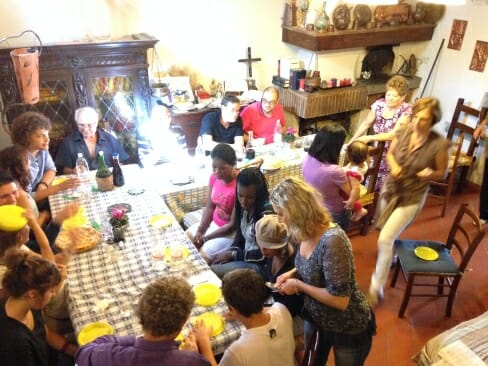
Apr 10, 2015 | Focolare Worldwide
https://vimeo.com/131567545 Cesar, an 18-year old from Ghana, was saved just when he was about to drown, after he had drunk water and fuel. On that journey, 72 people were saved while 32 died. Maria, a Nigerian and seven months pregnant, had received a phone call from her father while she was out with her husband and little son. He told them not to return home because the church had been burnt and her mother killed. They escaped with the little they had, and arrived in Libya. They had money for the journey to Italy of just one person, and so only she left. Her husband and little son remained on the other side of the Mediterranean, waiting for another embarkment. «These are heartbreaking glimpses of life. They remind us of Jesus’s words: “I was a stranger and you shared your home.” We would like to be the arms and heart for each of these refugees.» This is the story of Carla and David of Florence (Italy), who as a family opened their hearts to the welcoming of migrants. «In summer 2013, we participated with our three kids in the World Youth Day in Brazil. We took the opportunity then to spend some time to do missionary work in Salvador Bahia. It was a strong experience that opened our hearts to the spirit of sharing with those in need. Once we returned home, we decided to dedicate a part of the B&B we run to migrants. In that moment the mission had come to us! Since then, 756 people have passed through, coming from Syria, Pakistan, Nepal, Bangladesh and some countries of Africa. Some stayed only to take refreshments and depart for other European destinations while others remained longer. And in these cases, our relationships became close and very fraternal. 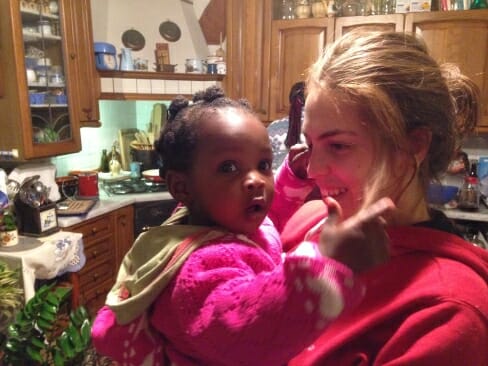 An Eritrean family now on its way to Norway, stayed for two months: he is Muslim while she is Christian, with six children who were left free by their father to choose their religion. When their mother arrived with the youngest son, they were hospitalized for dehydration, after which so also was the father, due to an infection. We remember their joy when we handed them a cell phone so that they could call their relatives to say they were all alive and well. On Sunday we all went to mass together in that tiny Church at the outskirts of Florence where Cardinal Betori was holding a pastoral visit. His whole homily centred on welcoming the homeless. In the end he embraced them and blessed everyone.
An Eritrean family now on its way to Norway, stayed for two months: he is Muslim while she is Christian, with six children who were left free by their father to choose their religion. When their mother arrived with the youngest son, they were hospitalized for dehydration, after which so also was the father, due to an infection. We remember their joy when we handed them a cell phone so that they could call their relatives to say they were all alive and well. On Sunday we all went to mass together in that tiny Church at the outskirts of Florence where Cardinal Betori was holding a pastoral visit. His whole homily centred on welcoming the homeless. In the end he embraced them and blessed everyone.  Three girls, one from Mali and another from Libya, both Muslims, came together with a young girl who escaped from Nigeria after witnessing the massacre of their parents because they were Christians. A sisterly relationship was created between them and with us, as if between parents and daughters. One Sunday while we were taking a walk, Mersi was very sad because that day on TV there was the news of another massacre in Nigeria. Finally, they received a phone call: their younger sister was able to escape to Libya with her father’s friend. The Libyan girl immediately contacted her family and the child – a Christian – was taken in by them who were Muslims. Here’s another picture: of Joy and Lorenz, who had seen their father killed because he was a Christian. I, David, as a social worker can get on the bus when refugees arrive. I do this at the risk of contracting diseases, but I know that the first approach is fundamental since it is then that we are able to identify the groups that, in the meantime, have been created among them. I saw that Joy was pregnant, and so I invited them to our centre. Also when the Prefecture moved them to another place, we continued to visit them, and when the baby was born, we brought them a pram and clothes which the New Families of the Focolare had gathered for them. Joy and Lorenz asked us to be little John’s godparents. This family was then sent to Puglia. The parting was strong but the relationship continues. The call us Mom and Dad. When they obtain their stay permit, they want to come to live close to us.»
Three girls, one from Mali and another from Libya, both Muslims, came together with a young girl who escaped from Nigeria after witnessing the massacre of their parents because they were Christians. A sisterly relationship was created between them and with us, as if between parents and daughters. One Sunday while we were taking a walk, Mersi was very sad because that day on TV there was the news of another massacre in Nigeria. Finally, they received a phone call: their younger sister was able to escape to Libya with her father’s friend. The Libyan girl immediately contacted her family and the child – a Christian – was taken in by them who were Muslims. Here’s another picture: of Joy and Lorenz, who had seen their father killed because he was a Christian. I, David, as a social worker can get on the bus when refugees arrive. I do this at the risk of contracting diseases, but I know that the first approach is fundamental since it is then that we are able to identify the groups that, in the meantime, have been created among them. I saw that Joy was pregnant, and so I invited them to our centre. Also when the Prefecture moved them to another place, we continued to visit them, and when the baby was born, we brought them a pram and clothes which the New Families of the Focolare had gathered for them. Joy and Lorenz asked us to be little John’s godparents. This family was then sent to Puglia. The parting was strong but the relationship continues. The call us Mom and Dad. When they obtain their stay permit, they want to come to live close to us.»
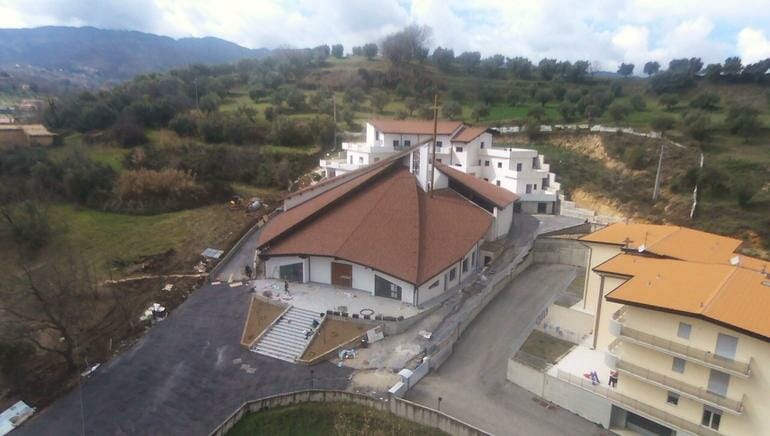
Apr 9, 2015 | Focolare Worldwide
 On 20 March the new parish church, dedicated to Christ the Saviour, was inaugurated in Mendicino, in Cosenza, Italy. The event was celebrated on the anniversary of Msgr. Nunnari and it fulfilled the dream of the entire parish community, composed of 10,000 inhabitants, which now enjoys a place of worship of an extremely unique structure. It comprises about 15 rooms for catechism lessons, a meeting hall and presbytery. The project, carried out by means of technical support by local experts, was designed by The Ave Arts Centre in Loppiano, which designs are inspired by research done through the years by a team of architects who work in the little town of the Focolare.
On 20 March the new parish church, dedicated to Christ the Saviour, was inaugurated in Mendicino, in Cosenza, Italy. The event was celebrated on the anniversary of Msgr. Nunnari and it fulfilled the dream of the entire parish community, composed of 10,000 inhabitants, which now enjoys a place of worship of an extremely unique structure. It comprises about 15 rooms for catechism lessons, a meeting hall and presbytery. The project, carried out by means of technical support by local experts, was designed by The Ave Arts Centre in Loppiano, which designs are inspired by research done through the years by a team of architects who work in the little town of the Focolare.
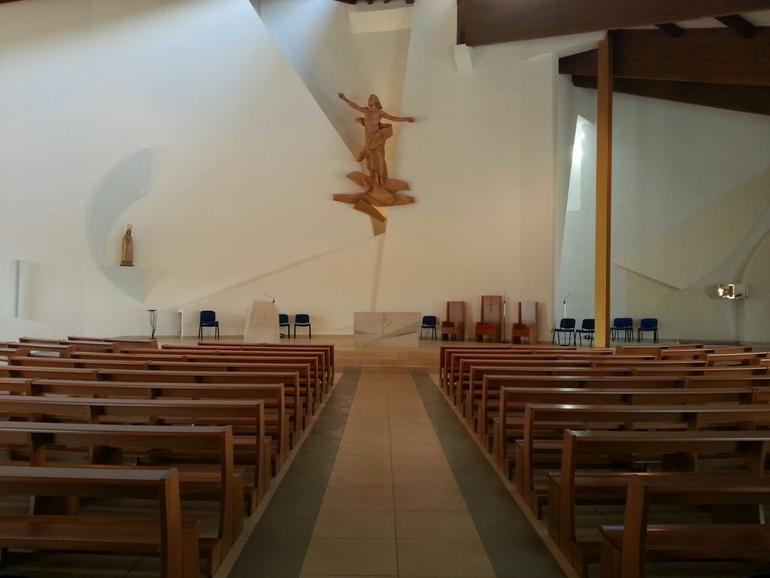 Apart from its constant internal reflection, this group aims at building a relationship of synergy also with architects in other parts of the world. Last December, for example, they participated at an international conference organised in Barcelona, Spain, by the Association of Catalonian Architects, on the theme of sacred patrimony. The team of architects took part not only as representatives of the Arts Centre in Loppiano, but also as part of the “Dialogue in Architecture” inundation of the Focolare Movement, which is composed of scholars and professionals whose main focus and interest revolves around the theme of architecture.
Apart from its constant internal reflection, this group aims at building a relationship of synergy also with architects in other parts of the world. Last December, for example, they participated at an international conference organised in Barcelona, Spain, by the Association of Catalonian Architects, on the theme of sacred patrimony. The team of architects took part not only as representatives of the Arts Centre in Loppiano, but also as part of the “Dialogue in Architecture” inundation of the Focolare Movement, which is composed of scholars and professionals whose main focus and interest revolves around the theme of architecture.
During this conference in Spain, three of the architects, Mario Mario Tancredi and Iole Parisi from Italy, and Tobias Klodwig from Germany, were asked to do a presentation entitled: “Flexible Christianity – Community Life and Sacred Spaces”. The approach that was presented greatly interested the 150 architects from Spain and other European countries who attended the conference.

The three speakers started off by explaining how forms and spaces in the field of architecture change according to the experience of different Christian communities. This generated a discussion and a reflection on the fact that architecture is always enriched by elements that are “intangible”, by what the very concept of “sacred” can assume in various cultural contexts: the strong social values perceived in Latin America; the prophetic ancestral signs found in Africa; the value of symbolic expressions contained in European cathedrals and churches in globalized metropolises. They pointed out a few concrete examples to illustrate this: the Church in Loppiano called Maria Théotokos, which is an expression of a contemporary charism, the Church of St Claire in Fontem, Africa, which communicates the values of the local culture, and some projects where disused churches in Germany had undergone a transformation.
With regards to the cultural research that “Dialogue in Architecture” aims to develop, it’s in continual evolution, driven by the need to bring together – precisely because it has to do with the Absolute One – continuity and innovation,and this is achieved by means of a dialogue which is evermore constructive both with the clientele and the academic world.
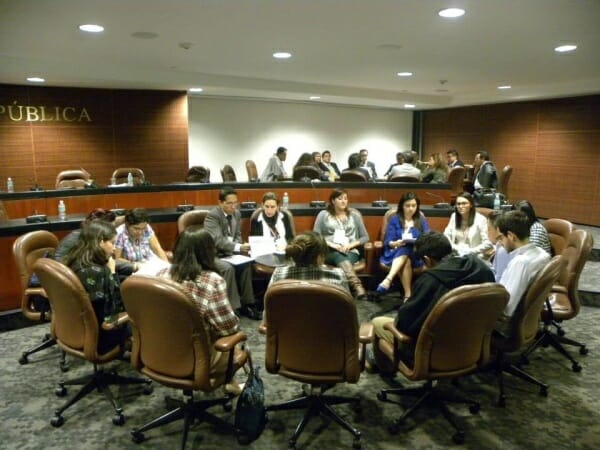
Apr 8, 2015 | Focolare Worldwide
 “Hi, my name’s Abraham, and I come from Mexico: a population of noble and deeply religious people, with their arms spread out to the world.” These were his opening words to an audience of 300 young people in a hall of the Italian Parliament, who gathered to pay homage to Chiara Lubich and her prophetic vision of politics. Abraham has brought along his background in a country torn apart by narcotrafficking and the lords of death. He himself had lived the experience of having a gun pointed at his head by the police who mistook him for a drug pusher while the real one was standing beside him, forced by poverty to take that path. “In 2006,” he continued, “the battle against narcotraffic was a war that in eight years had left on the field more war victims than in Vietnam, among which were many innocent people who struggle every day to maintain their civil commitment: journalists, activists, etc. Often the people protested against the Government which has been losing its credibility amid a strong social and economic crisis”
“Hi, my name’s Abraham, and I come from Mexico: a population of noble and deeply religious people, with their arms spread out to the world.” These were his opening words to an audience of 300 young people in a hall of the Italian Parliament, who gathered to pay homage to Chiara Lubich and her prophetic vision of politics. Abraham has brought along his background in a country torn apart by narcotrafficking and the lords of death. He himself had lived the experience of having a gun pointed at his head by the police who mistook him for a drug pusher while the real one was standing beside him, forced by poverty to take that path. “In 2006,” he continued, “the battle against narcotraffic was a war that in eight years had left on the field more war victims than in Vietnam, among which were many innocent people who struggle every day to maintain their civil commitment: journalists, activists, etc. Often the people protested against the Government which has been losing its credibility amid a strong social and economic crisis”
“I live in Mexico City where every day, we are faced with a new challenge; despite this I believe in a united world and in the ideal of a united world and universal brotherhood. But I know that change has to start from myself, without expecting it from the others and not even from the authorities.”
“If I were you, who are so concerned for the common good in Mexico,” affirmed Luigino Bruni addressing the youth – I would try to look at the causes of this disease, among which is financial capitalism that increases the inequalities. These are types of wealth that are no longer inclusive.» «The first step to take when one wishes to change a country is to love it,» the economist underlined again, spurred by the testimonial of Abraham. «Every country has its vocation to beauty, its own genius, and identity, though ambivalent.» And then an advice: study more, learn a profession! «Are you a minority? It does not matter. Just a handful would suffice, few but really very motivated. It is the prophetic minority that changes the world. And do not stop believing that a different world is possible. The first battle to fight when we are young is to not lose faith in the ideal. We have to believe in the impossible in order to have a good possibility.“
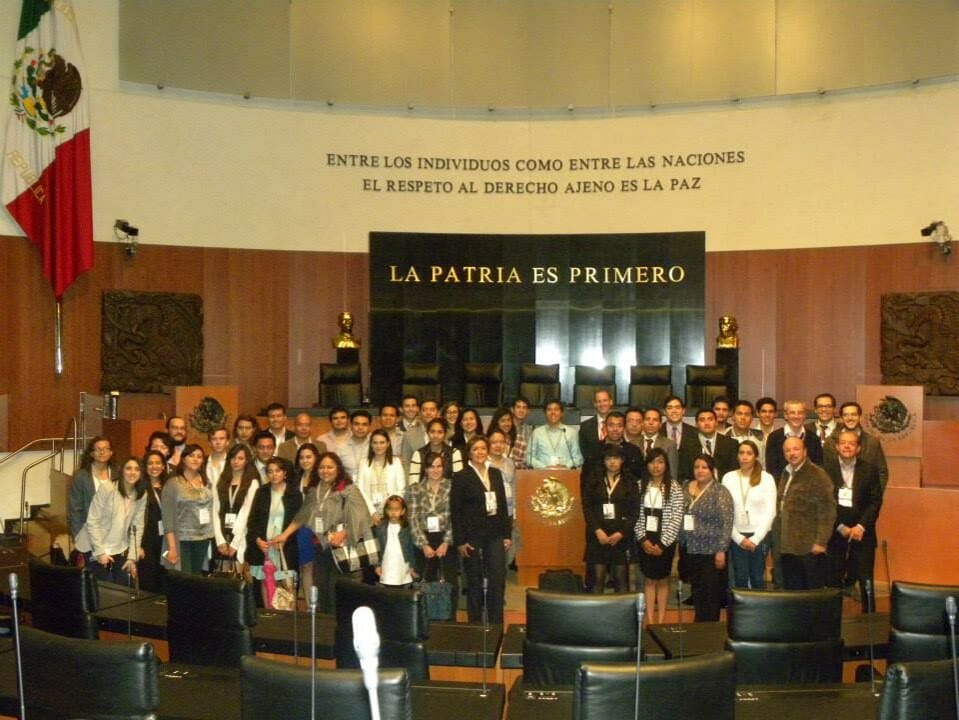
At the Mexican Senate
“Some offered me drugs many times, others robbed me,” continued Abraham, “Some time ago while going home after school, a boy approached me asking for a cigarette. At the same time the police arrived to arrest us. He had drugs in his pocket while I only had books in my backpack. They started to beat him up while the other policeman held a gun at my head, asking me where the drugs were. When the police left, I helped this boy to his feet and gave him the little money I had. He embraced me and said: “You know, I feed my family with these few coins?” I realised how a small act of love really releases great strength and we never know how far it will go. Despite my feeling so helpless, I want to try and see my neighbours and the people I meet on the street with new eyes, and with other friends I want to give a concrete contribution.
“In my desire to a greater commitment for the good of my country, despite the many difficulties and discouragement of many, on 20 March the youth of diverse organisations met in the Mexican Senate for a day’s event with politicians on dialogue, which is very important in a world that is awaiting the answers to bigger challenges.”

 «Many have tried to explain the roots and reasons behind the start of monastic life, but the sayings and experiences of the Fathers show that the monks are “living martyrs,” and that they “abandoned the world to embrace the sole reality worth living for – God.” It is as if they wanted to respond to God’s love, which is fully described in a verse of the Coptic Mass we call the Divine Liturgy, which addresses God saying: “Of all the words said, there is nothing that can describe Your love for mankind.” St. Jerome says that their asceticism and life as hermits proclaim, “we have been struck by the darts of Divine love,” and each one repeats: “I have found what my soul longs for; I will hold on to it tightly and never leave it.” These monks, therefore, only wishing to give themselves completely to this love and to consecrate themselves to Him, had no choice but to leave the cities.
«Many have tried to explain the roots and reasons behind the start of monastic life, but the sayings and experiences of the Fathers show that the monks are “living martyrs,” and that they “abandoned the world to embrace the sole reality worth living for – God.” It is as if they wanted to respond to God’s love, which is fully described in a verse of the Coptic Mass we call the Divine Liturgy, which addresses God saying: “Of all the words said, there is nothing that can describe Your love for mankind.” St. Jerome says that their asceticism and life as hermits proclaim, “we have been struck by the darts of Divine love,” and each one repeats: “I have found what my soul longs for; I will hold on to it tightly and never leave it.” These monks, therefore, only wishing to give themselves completely to this love and to consecrate themselves to Him, had no choice but to leave the cities. he spiritual presence of Jesus in our midst with the Catholic focolarine with whom I live in the Focolare Centre in Sohag, and the commitment to love each other, have made us like real sisters and caused us to experiment the joy of the Risen Lord, beyond all our differences. In our daily life we share everything we have: we pray, work, rejoice and share the moments of suffering of the people around us. We try to bear witness through our lives, that God is love.
he spiritual presence of Jesus in our midst with the Catholic focolarine with whom I live in the Focolare Centre in Sohag, and the commitment to love each other, have made us like real sisters and caused us to experiment the joy of the Risen Lord, beyond all our differences. In our daily life we share everything we have: we pray, work, rejoice and share the moments of suffering of the people around us. We try to bear witness through our lives, that God is love. 

 I went to the morgue where they were taking the bodies of the students for identification, not far from my home in Nairobi. I took my camera along. It was impossible not to hear the sirens. I found the parents of the murdered students fainting on one side. . . and on ther other my colleagues with news cameras. I could certainly have shot a few interviews, but I just couldn’t do it; I found myself weeping with the families. There was strong pressure from all sides, opinions from the public who were anxious for news. But I needed time to digest the painful situation in order to be able to say something that would be constructive. I felt my task was to remain quiet with this pain and resist the pressure.”
I went to the morgue where they were taking the bodies of the students for identification, not far from my home in Nairobi. I took my camera along. It was impossible not to hear the sirens. I found the parents of the murdered students fainting on one side. . . and on ther other my colleagues with news cameras. I could certainly have shot a few interviews, but I just couldn’t do it; I found myself weeping with the families. There was strong pressure from all sides, opinions from the public who were anxious for news. But I needed time to digest the painful situation in order to be able to say something that would be constructive. I felt my task was to remain quiet with this pain and resist the pressure.” 


 “At the end of one conference, one of my scholastic colleagues showed me three photos of some ex-students of the University who had been killed in the conflict in the south of the country. With eyes filled with tears, he told me that every evening after lessons, a group of students gathers in the cafeteria of the university to cook Ukrainian dishes, which are then frozen and delivered to soldiers. Annother woman told me about her six year-old son who draws cartoons and sends them to soldiers, as a sign of thanks for defending his country. Unfortunately, unlike last year, the news is no longer reporting on what is taking place in Ukraine. Yet, there is actually a war underway in East Ukraine.” There seems to be no way out of the situation that is generating suffering and suspense in the hearts of the people. . . “I had living proof of this deep suffering during every moment of my stay in Ukraine. Students and professors asked me what I thought about the situation in the country and, above all, what the rest of Europe was saying. I didn’t have the nerve to express judgements. Faced with their fear and suffering I preferred to listen and stay silent. I was impressed by the strength and dignity of that people, but it also frightened me that the rest of Europe and of the world have abandoned them to their fate, aggravated also by the growing nationalism, another phenomenon that could be hiding large dangers for the future.”
“At the end of one conference, one of my scholastic colleagues showed me three photos of some ex-students of the University who had been killed in the conflict in the south of the country. With eyes filled with tears, he told me that every evening after lessons, a group of students gathers in the cafeteria of the university to cook Ukrainian dishes, which are then frozen and delivered to soldiers. Annother woman told me about her six year-old son who draws cartoons and sends them to soldiers, as a sign of thanks for defending his country. Unfortunately, unlike last year, the news is no longer reporting on what is taking place in Ukraine. Yet, there is actually a war underway in East Ukraine.” There seems to be no way out of the situation that is generating suffering and suspense in the hearts of the people. . . “I had living proof of this deep suffering during every moment of my stay in Ukraine. Students and professors asked me what I thought about the situation in the country and, above all, what the rest of Europe was saying. I didn’t have the nerve to express judgements. Faced with their fear and suffering I preferred to listen and stay silent. I was impressed by the strength and dignity of that people, but it also frightened me that the rest of Europe and of the world have abandoned them to their fate, aggravated also by the growing nationalism, another phenomenon that could be hiding large dangers for the future.” 









